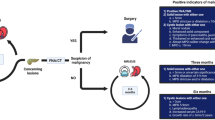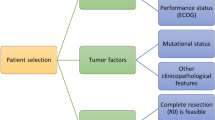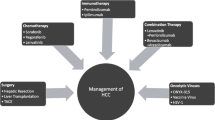Abstract
Aim
To assess the overall survival (OS) in those with hepatocellular carcinoma (HCC) diagnosed within a programmatic, centrally co-ordinated, regional screening programme.
Methods
A retrospective cohort analysis of consecutive HCC patients diagnosed between 2004 and 2013. Patients were followed up till death or end of study period (30 April 2015). A dedicated screening programme was commenced in 2009 to screen high-risk patients for HCC. Primary objective is to compare the OS between HCC patients diagnosed within the screening group versus those diagnosed outside this group. Other objectives were to compare tumour stage at diagnosis and the proportion having curative treatments in the two groups. Propensity score adjustments were performed to assess the survival benefit.
Results
HCC was diagnosed in 130 subjects during the study period (82.3% males, median [IQR] age 62 [± 19] years and median [IQR] follow-up of 11.3 (± 23.5) months). Ninety-six patients (73.8%) died during the follow-up, and the median (95%CI) OS was 15.7 (9.7–21.8) months. HCC diagnosed within the screening programme had a better OS compared to those diagnosed outside this programme (26.8 vs 11.5 months, p = 0.01). Further, those diagnosed within the programme had an earlier stage HCC ([58.3% vs 23.6%], Ӽ2 = 11.3, p = 0.001), and a significant proportion were treated with curative intent ([62.5% vs 31.1%], Ӽ2 = 8.3, p = 0.004). Propensity score adjustment showed a 58% reduction in mortality for HCC diagnosed within the screening programme (HR [95%CI] 0.42 [0.20–0.89], p = 0.02).
Conclusion
A programmatic, regional HCC screening programme improved the OS and detected tumours at an earlier stage enabling more patients to have curative therapies.


Similar content being viewed by others
References
Jemal A, Bray F, Center MM, Ferlay J, Ward E, Forman D. Global cancer statistics. CA Cancer J Clin. 2011;61(2):69–90.
Torre LA, Bray F, Siegel RL, Ferlay J, Lortet-Tieulent J, Jemal A. Global cancer statistics, 2012. CA Cancer J Clin. 2015;65(2):87–108.
Clark HP, et al. Staging and current treatment of hepatocellular carcinoma. Radiographics. 2005;25(Suppl 1):S3–23.
Bruix J, Sherman M. Management of hepatocellular carcinoma: an update. Hepatology. 2011;53(3):1020–2.
Heimbach JK, Kulik LM, Finn RS, Sirlin CB, Abecassis MM, Roberts LR, et al. AASLD guidelines for the treatment of hepatocellular carcinoma. Hepatology. 2018;67(1):358–80.
European Association for the Study of the Liver. Electronic address, e.e.e. and L. European Association for the Study of the, EASL Clinical Practice Guidelines: Management of hepatocellular carcinoma. J Hepatol. 2018;69(1):182–236.
Omata M, Cheng AL, Kokudo N, Kudo M, Lee JM, Jia J, et al. Asia-Pacific clinical practice guidelines on the management of hepatocellular carcinoma: a 2017 update. Hepatol Int. 2017;11(4):317–70.
Zhang BH, Yang BH, Tang ZY. Randomized controlled trial of screening for hepatocellular carcinoma. J Cancer Res Clin Oncol. 2004;130(7):417–22.
Poustchi H, Farrell GC, Strasser SI, Lee AU, McCaughan GW, George J. Feasibility of conducting a randomized control trial for liver cancer screening: is a randomized controlled trial for liver cancer screening feasible or still needed? Hepatology. 2011;54(6):1998–2004.
Kennedy NA, Rodgers A, Altus R, McCormick R, Wundke R, Wigg AJ. Optimisation of hepatocellular carcinoma surveillance in patients with viral hepatitis: a quality improvement study. Intern Med J. 2013;43(7):772–7.
Davila JA, Morgan RO, Richardson PA, du XL, McGlynn KA, el-Serag HB. Use of surveillance for hepatocellular carcinoma among patients with cirrhosis in the United States. Hepatology. 2010;52(1):132–41.
Noda I, Kitamoto M, Nakahara H, Hayashi R, Okimoto T, Monzen Y, et al. Regular surveillance by imaging for early detection and better prognosis of hepatocellular carcinoma in patients infected with hepatitis C virus. J Gastroenterol. 2010;45(1):105–12.
Mittal S, Kanwal F, Ying J, Chung R, Sada YH, Temple S, et al. Effectiveness of surveillance for hepatocellular carcinoma in clinical practice: a United States cohort. J Hepatol. 2016;65(6):1148–54.
Cucchetti A, Trevisani F, Pecorelli A, Erroi V, Farinati F, Ciccarese F, et al. Estimation of lead-time bias and its impact on the outcome of surveillance for the early diagnosis of hepatocellular carcinoma. J Hepatol. 2014;61(2):333–41.
Author information
Authors and Affiliations
Corresponding author
Ethics declarations
The study protocol was approved by the Southern Adelaide Clinical Human Research Ethics Committee (SAC HREC).
Conflict of Interest
The authors declare that they have no conflict of interest.
Rights and permissions
About this article
Cite this article
Chinnaratha, M.A., Campbell, K., Mathias, R. et al. Improved Survival of Hepatocellular Carcinoma Patients Diagnosed with a Dedicated Screening Programme—a Propensity Score Adjusted Analysis. J Gastrointest Canc 50, 888–893 (2019). https://doi.org/10.1007/s12029-018-0171-7
Published:
Issue Date:
DOI: https://doi.org/10.1007/s12029-018-0171-7




